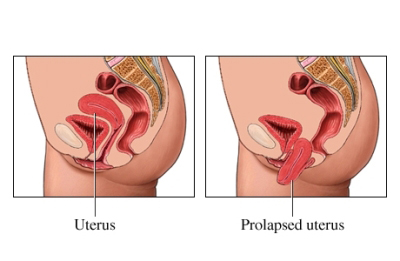
In uterine prolapse, the uterus loses its support and slips down into the vagina and may even protrude out of the vagina. This happens when the pelvic floor muscles and ligaments stretch and become weak due to the various reasons as discussed below. It mostly affects postmenopausal women who have had one or more natural deliveries.
Mild uterine prolapse is often asymptomatic and goes unnoticed. Moderate or severe uterine prolapse may cause the following problems for you
• Tissue (structure) protruding from the vagina
• Uneasy sensation of something falling out of the vagina
• Vaginal discharge
• Heaviness in the pelvis
• Low back ache
• Urinary problems
• Constipation
• Sexual difficulties
Most of the problems are minimal when you get up in the morning, after a night's rest and become worse as the day goes on.
The uterus is supported by the pelvic floor muscles and ligaments. Weakening of these structures as a result of being stretched and traumatized during pregnancy and childbirth is the primary cause of prolapse. Uterine prolapse often occurs after menopause when these muscles further lose their tone from ageing and reduction in estrogen levels.
The following are known risk factors for uterine prolapse :
• Multiple natural deliveries
• Prolonged deliveries
• Frequent lifting of heavy weights
• Chronic coughing
• Chronic constipation
• Prior pelvic surgery
• Genetic predisposition
• Obesity
We will perform general and pelvic examination to determine whether the pelvic organs are in its normal position. During this examination we insert a speculum and examine vagina and uterus. This is done as outpatient procedure and is generally painless. If prolapse is diagnosed we will have to look for cause and will do some basic tests for the same
• Maintain correct weight
• Exercise regularly
• Women with history of vaginal delivery are taught to do kagel's exercise to strengthen the pelvic floor
• Avoid chronic cough by taking proper treatment
• Early diagnosis of mild prolapse
We will perform general and pelvic examination to determine whether the pelvic organs are in its normal position. During this examination we insert a speculum and examine vagina and uterus. This is done as outpatient procedure and is generally painless. If prolapse is diagnosed we will have to look for cause and will do some basic tests for the same
• Maintain correct weight
• Exercise regularly
• Women with history of vaginal delivery are taught to do Kagel's exercise to strengthen the pelvic floor
• Avoid chronic cough by taking proper treatment
• Early diagnosis of mild prolapse
The treatment of uterine prolapse depends on the degree of prolapse, that is, the severity of the slippage of the uterus down the vagina. For mild degrees of prolapse, the preventive measures listed above are initiated. These are simple measures that, if pursued sincerely and vigorously, can prevent further progression of prolapse. It is therefore extremely helpful to seek medical attention when you notice early features of prolapse so that it does progress to severe grades requiring surgery. As explained above, uterine prolapse is the result of weakening of the pelvic floor. The pelvic floor can be strengthened using a synthetic mesh or a piece of your own tissue. This can be done through the vagina without having to make a skin incision. If repair from the front of the belly is required, it can be done with laparoscopic technique so that scarring is minimal and recovery is quicker. Older women who have completed their families and have severe grades of prolapse may require a hysterectomy for eliminating the problem.
Talk to us if you have any queries on uterine prolapse and fertility treatments in Chennai. You can take expert advice from our doctors regarding the symptoms, causes, treatment, diagnosis and the risk factors associated with uterine prolapse.